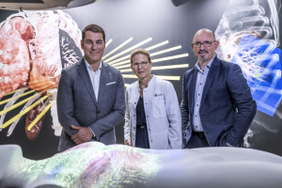Stefan Vilsmeier and Claus Promberger from Brainlab, a leading provider in the field of digital medical technology, and Prof. Cordula Petersen from the UKE in Hamburg, have been nominated for the German Future Prize 2022 "Prize of the Federal President for Technology and Innovation" with the technology ExacTrac Dynamic®, an improved radiation method specifically for lung cancer patients. The prize has been awarded by the German President for over 25 years and honors outstanding technical, engineering or scientific as well as software and algorithm-based innovations in a national performance comparison. The German Future Prize is endowed with 250,000 euros and is one of the most important science prizes in Germany.
Brainlab is nominated for an improved radiation method specifically for lung cancer patients. In these patients in particular, irradiation is complicated because the tumor is constantly moving as the patient breathes. The new technology enables millimeter-precise detection of the patient's position during radiation treatment and verification of the tumor's position using real-time data. The treatment ray can thus be controlled according to the tumor position, reducing damage to surrounding healthy tissue. This is expected to enable faster treatment with fewer side effects than conventional radiation treatments.
For the development of this groundbreaking method, Brainlab founder Stefan Vilsmeier and Brainlab Head of Development Claus Promberger worked intensively with Prof. Cordula Petersen, Director of the Clinic for Radiation Therapy and Radiooncology at the Universitätsklinikum Eppendorf (UKE). Petersen was one of the first to use the new, high-precision radiotherapy in the daily routine of radiation oncology at the UKE, provided regular feedback on its implementation in practice, and contributed experience on treatment concepts of stereotactic radiosurgery and radiotherapy.
"The nomination for the German Future Prize is an outstanding award for the work of our interdisciplinary team from research and clinical practice," says Stefan Vilsmeier, founder and CEO of Brainlab. "It confirms that we are on the right track with our vision of using software-based medical technology to decisively advance cancer therapy and make it accessible to more people worldwide. Radiation therapy can play a decisive role in this in the future - possibly as the first treatment of choice."
Prof. Cordula Petersen adds: "The potential of the technology is enormous: In the future, numerous cancer patients could be treated faster and with fewer side effects than with conventional radiation treatments, which can potentially damage the lungs - this can help to enable a better quality of life for patients. In addition, the chances of cure increase significantly, because even very small tumors in early stages could be treated with this method in the future."
Further nominees in electromobility and new microscope technology
In the future, most cars will be powered by electricity rather than an internal combustion engine. Their electric cars will draw energy from an on-board battery that needs to be recharged regularly. Until now, the bottleneck has been the charging time, which takes several hours - a disadvantage of electromobility. The three nominees, Thomas Speidel, Dr. Thorsten Ochs from ads-tec Energy GmbH GmbH in Nürtingen and Stefan Reichert from theFraunhofer-Institut für Solare Energiesysteme ISE in Freiburg, have developed an innovative system that provides a simple way of charging electric car batteries almost anywhere. All that is needed is a normal power connection without having to expand or modify the power-limited grid infrastructure.
Also nominated is the team of Thomas Kalkbrenner, Jörg Siebenmorgen and Ralf Wolleschensky from Carl Zeiss Microscopy GmbH in Jena. Their novel microscope for gentle imaging and long-term observation of living cells opens up new possibilities in cell research in biology, medicine and pharmacology.
Important science prize in Germany
The nominations for the Deutscher Zukunftspreis (German Future Prize) were preceded by a multi-stage selection process by a jury of ten independent experts from science and practice. In addition to other aspects, the following criteria were particularly important for the decision: the degree of scientific and technical innovation of the technology as well as its patentability and the implementation that has already been achieved or is imminent.
The German Future Prize is endowed with 250,000 euros and is one of the most important science prizes in Germany. The nomination alone is considered a high honor.
Federal President Frank-Walter Steinmeier will present the Deutscher Zukunftspreis 2022 on October 26 in Berlin.

